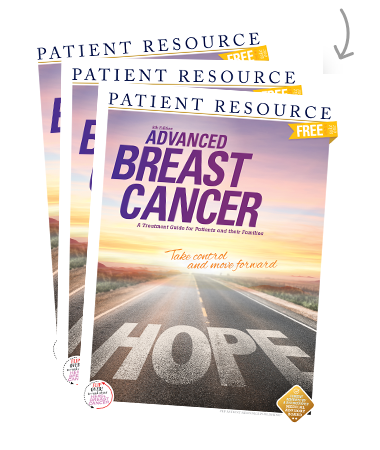Advanced Breast Cancer
Supportive Care
You are strong, but now is not the time to rely on yourself alone. Navigating your diagnosis will take the knowledge, resources, strength and support of many people, including your family and friends, health care team, spiritual community and many others you have yet to meet. Open your mind and heart, and accept their valuable advice and experience.
What is Supportive Care?
Supportive care can begin as soon as you receive your diagnosis. You may hear it referred to as palliative care, but do not let that alarm you. It is not the same as hospice care. Instead, it is specialized medical care for people living with a serious illness. Palliative care is all about preserving or restoring your quality of life, and your palliative care specialists will work closely with you to ensure your needs are met.
Many types of services fall within the supportive care category, and they are designed to accomplish the same goal: help you maintain your desired quality of life by offering physical, emotional, practical, financial and spiritual support for you and your loved ones. Your doctor, nurse, patient navigator or case worker can explain how you may benefit and how to get started.
Preventing, minimizing and managing the physical side effects of the cancer and its treatment is one of the most common needs you will have. Though some side effects are simply an inconvenience, others can disrupt your quality of life. Examples include severe diarrhea that keeps you homebound or mouth sores that prevent you from eating and getting the nutrition your body needs. Still others have the potential to be serious or even life-threatening and could be a side effect or symptom of the cancer progressing (such as having a seizure), making it critical that you know what to do if a potentially serious side effect or symptom occurs.
Along with offering physical relief, resources are also available to help you with your emotional well-being. You can expect to experience a range of feelings, from anxiety and fear to doubt and depression. It is very important to acknowledge and address them and to realize that it will be much easier to have help doing so. Consider discussing your fears with your friends, a support group or a therapist.
Your nurse navigator can connect you with the advanced breast cancer community. Support is available there in many forms — in person, by phone and online. Many organizations offer one-on-one buddy and peer support programs that pair you with another person who shares your diagnosis. Sharing your feelings with an advanced breast cancer survivor can offer a level of understanding and comfort that is difficult to find with someone who has not experienced advanced or metastatic cancer.
Following are more areas to explore. If you need help in an area not listed here, talk with a member of your health care team.
- Nutritional support may be needed to ensure you are able to get the nutrients your body needs. If a dietitian or nutritionist is not on your health care team, ask for a referral.
- Sexual health is an important part of life. Your treatments may have physical or emotional side effects that affect your desire, confidence or physical ability. Talk with your doctor about ways to maintain your sexuality, or ask for a referral to a therapist who has experience working with people who have metastatic breast cancer.
- Financial counseling may help relieve the stress and anxiety of managing the ongoing costs associated with treating advanced breast cancer. Understanding the costs early and learning about the resources that may help financially can make you feel more in control.
- Spiritual or religious guidance can be available from a chaplain or spiritual care advisor at your hospital or in your religious community. Spiritual support is available to you even if you do not consider yourself a religious person.

Boost Your Mood by Leading a Healthy Lifestyle
Feeling good about the decisions you make can be uplifting. And though you may feel as if many parts of your life are out of your control, you can – for the most part – choose the foods you eat, the exercise you take part in and the activities that give you joy.
Follow a nutritious diet. Maintaining a healthy weight is important, especially if treatment is causing you to lose or gain weight. Whether you are trying to lose, gain or maintain, make sure to eat the essential nutrients, including carbohydrates, fats and protein. If following a healthy diet is a challenge, consider meeting with a registered dietitian. Together, you can create a nutrition plan and discuss your concerns. If a dietitian is not on your medical team, ask your nurse navigator for a referral.
Exercise. Even a 10-minute daily walk can energize you and offer multiple health benefits, such as reducing anxiety, depression and fatigue. Physical activity is also a natural way to boost your mood, offering drug-free relief for many of the emotional side effects of cancer and its treatment.
Take care of you. Whether it’s reading a book, watching a movie, crocheting, getting a massage by a certified oncology massage therapist or something else, make time to do whatever puts you in your happy place.



